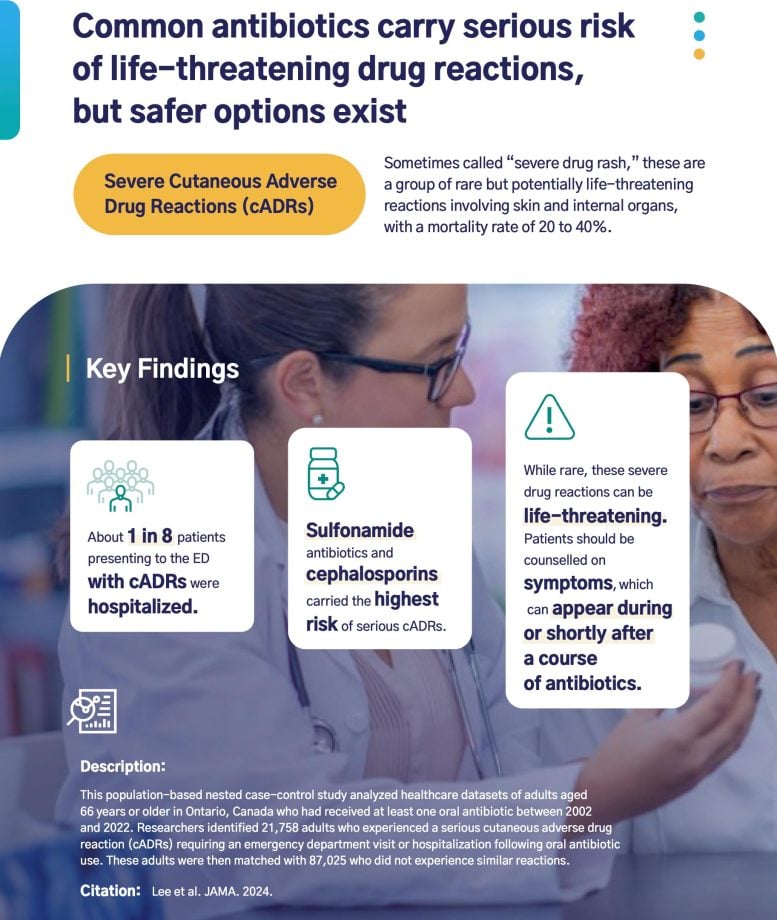
A study involving elderly adults in Ontario reveals that certain oral antibiotics significantly increase the risk of severe drug rashes, leading to emergency visits and potentially fatal outcomes.
Researchers advocate for the cautious prescribing of antibiotics, especially among older adults, highlighting that while most hospital visits are non-fatal, a small percentage result in intensive care or death.
Two classes of commonly prescribed oral antibiotics are associated with the greatest risk for severe drug rashes that can lead to emergency department visits, hospitalizations, and even death, according to a new study.
Researchers from ICES, Sunnybrook Research Institute and the Department of Medicine at the University of Toronto’s Temerty Faculty of Medicine suggest that prescribers should consider using lower-risk antibiotics for their patients when clinically appropriate.
Impact of Severe Drug Rashes
Serious cutaneous adverse drug reactions (cADRs), or severe drug rash, are a group of rare but potentially life-threatening delayed reactions involving the skin and, often, internal organs. Some of these reactions carry mortality rates from 20 to 40%. While many different classes of drugs can cause serious cADRs, antibiotics are among the most commonly reported triggers for these reactions.
“Clinicians have speculated that certain antibiotics carry greater risk for these severe reactions, but no study has ever confirmed these claims,” says Erika Lee, an allergist and a trainee with ICES and Temerty Medicine’s Eliot Phillipson Clinician-Scientist Training Program. “Our objective was to explore the risk for cARDs in a population of older adults, who tend to receive disproportionately more antibiotic prescriptions than younger adults.”

Published in the journal JAMA, this case-control study used healthcare data from ICES of adults 66 years or older who received a prescription for at least one oral antibiotic between 2002 and 2022 in Ontario, Canada.
Over the study period, 21,758 adults had an ED visit or hospitalization for a serious cADR following oral antibiotics and were matched with 87,025 controls who did not have a reaction.
Risk Highest for Two Classes of Antibiotics
“The good news is that most patients who visited the hospital with these reactions were discharged without being admitted, so that should be reassuring to providers and patients,” says Lee. “However, of those who were admitted to hospital with the most severe reactions, twenty percent were treated in the ICU, and five percent of hospitalized patients died, which underscores the need for careful prescribing practices.”
The most commonly prescribed antibiotics were penicillins (29%), followed by cephalosporins (18%), fluoroquinolones (17%), macrolides (15%) nitrofurantoin (9%) and sulfonamides (6%). Less commonly prescribed antibiotics were grouped together and accounted for 7% of prescriptions.
Disproportionate Risks With Specific Antibiotics
Key findings include:
- All antibiotics were associated with a higher risk of serious cADRs relative to macrolides, but sulfonamides (“sulfa drugs”) and cephalosporins were associated with the highest risk.
- There were 2 cADR-related hospital visits for every 1000 antibiotic prescriptions dispensed
- About 1 in 8 patients presenting to the ED with antibiotic-related cADRs was hospitalized, likely because their reactions were more severe or because of concerns about potential complications.
- 20% of hospitalized patients with the most severe forms of cADRs were treated in a critical care unit, and 5% of those patients died.
Recommendations for Clinicians and Patients
“While rare, these severe drug reactions can be life-threatening. Patients should be aware of rash, fever, and other symptoms, which can start weeks after a prescription has been started and even after the course of antibiotics has stopped,” says David Juurlink, a staff internist and head of the Division of Clinical Pharmacology and Toxicology at Sunnybrook Health Sciences Centre, senior core scientist with ICES and professor of medicine with Temerty Medicine.
“It’s also one more reason why antibiotics should be prescribed only when they’re truly needed,” he adds.
Reference: “Oral Antibiotics and Risk of Serious Cutaneous Adverse Drug Reactions” by Erika Y. Lee, Tara Gomes, Aaron M. Drucker, Nick Daneman, Ayesha Asaf, Fangyun Wu, Vincent Piguet and David N. Juurlink, 8 August 2024, JAMA.
DOI: 10.1001/jama.2024.11437